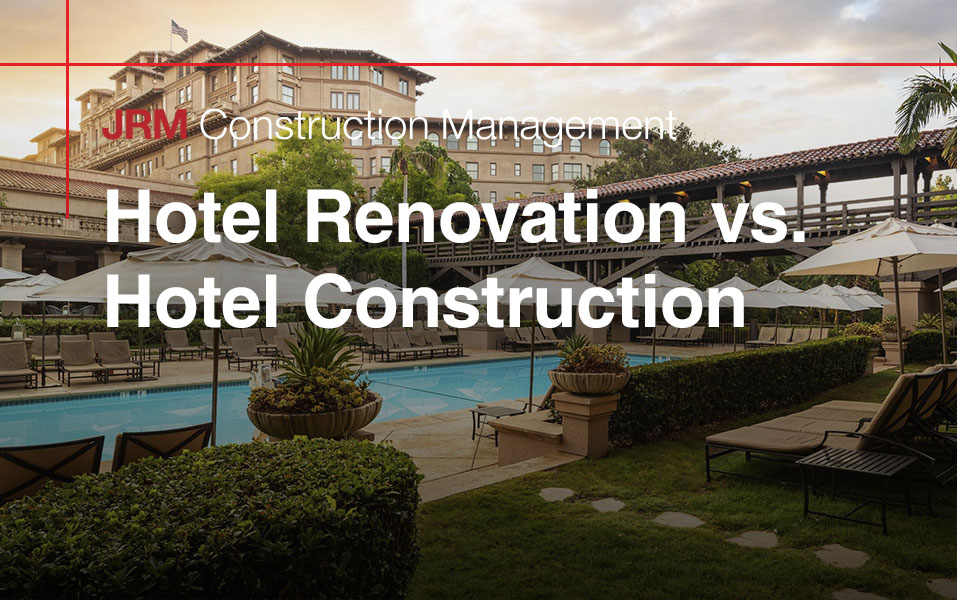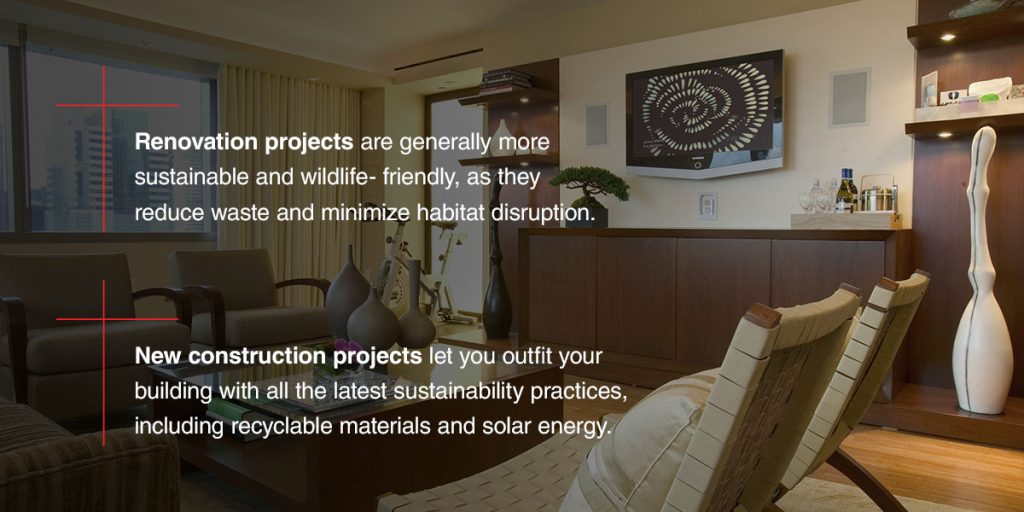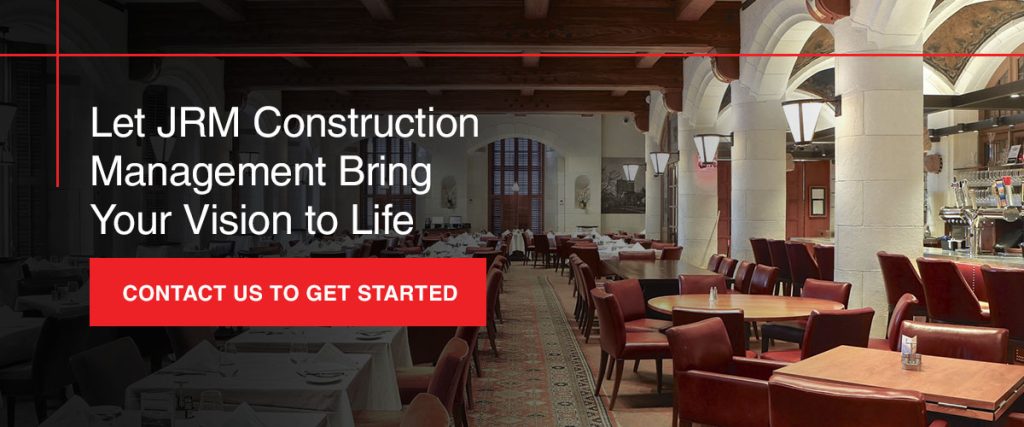Hotel Renovation vs. Hotel Construction

04/26/2024
Revenue in the United States hotel industry has surpassed $189 billion in recent years, and renovation and new construction projects are booming alongside the increased demand. In many ways, it’s an optimal time to start or expand your hospitality business — but which approach is best?
The Advantages of Hotel Renovation
Hotel renovation projects have seen a near-40% year-over-year increase — and for a good reason. Full or partial refreshes to a facility’s interior and exterior can let you stay competitive and eliminate the need to secure a new property. A renovation can range anywhere from upgrading the flooring and adding new paint to building a new fitness center or installing touchless payment options.
Here are some advantages to consider:
- Enhance the guest experience: Renovating your hotel lets you upgrade existing amenities or integrate new features to enhance the guest experience. Many brands refresh their facilities cosmetically every seven to 10 years, depending on your budget and local market. You might also renovate to expand your hotel and add more rooms as demand increases.
- Refresh your branding: Renovations let you freshen up your branding through new color schemes or decorating themes.
- Retain a place’s natural charm: While new construction projects build from scratch, a renovation lets you work with what you already have to retain an existing property’s natural charm, history or architecture. This can be a memorable selling point, especially if you operate in a highly competitive market and need to stick out.
- Improve energy efficiency: Updating your building’s utility components to be more energy efficient could save you on monthly electricity costs. You can also reduce how much you spend on ongoing maintenance by installing new features — like hinges or plumbing — instead of relying on outdated or worn ones.
- Meet new standards: All hospitality businesses must comply with certain local and industry-wide regulations, such as Americans with Disabilities Act accessibility and city building codes. Renovating your hotel lets you stay up-to-date with these standards.
- Save and grow capital: Renovating an existing property means you don’t have to invest in a brand new building, materials and construction process. This can be an ideal option for those who need to make critical changes on a limited budget. You also avoid those tricky construction timelines, leading to a faster return on investment than if you were working from the ground up.
While renovations are certainly beneficial and the best option for many property owners, there are a few things to consider during the planning process:
- Disruption to business: Depending on the scope of your project, a renovation might disrupt daily operations and interfere with the guest experience. Be sure to have a clear communication plan in place and consider offering discounts or incentives to maintain good business during this time.
- Property-specific obstacles: Every building has its own set of quirks to contend with, such as outdated electrical components or a challenging location. Renovating means working around these obstacles, which could prove costly.
- Ongoing maintenance costs: Upgrading existing facilities might mean more money spent on ongoing maintenance. For example, adding a few new pipes and fittings to an old building’s plumbing will likely require more upkeep than a new building with an all-new installation and state-of-the-art equipment.
The Advantages of Hotel Construction
New hotel builds let you create the exact business you want, from the interior style to the type of building foundation. You can curate each part of your resort or inn to fill the exact hole in your local hospitality market, setting you up for long-term success. Here are a few more benefits to note:
- Fewer design restrictions: Building a new hotel means you’re not limited to an existing building’s restrictions, such as the location of joists or fixed structures. You have design freedom to create a brand you’re proud of.
- Meet the market where it’s at: Starting at the beginning lets you meet the market where it’s at with a design and features that exceed your competitors’ offerings. Have you found the perfect coastal vacation spot that lacks a luxury resort? You can make it happen. Your business can also access new clientele markets instead of catering to an existing one that may not fit your target demographic.
- Integrate state-of-the-art amenities: Your new construction design can include customer-grabbing amenities right from day one. For example, you could integrate facilities that let you offer on-site catering or a cafe for guests. You can also install the most modern technology to ensure a seamless guest experience at check-in and check-out. You can likely charge guests more for the premium experience, too.
- Minimize ongoing expenses: Installing all new fixtures and appliances means optimizing your building for energy efficiency and lower utility costs while reducing the need for ongoing maintenance to stay operational.
New construction gives you endless freedom to create the perfect destination for guests — but don’t forget to consider these factors:
- Securing startup capital: You must secure all capital needed to purchase or lease a property, as well as all costs needed to build, outfit, style and market your new business. Many business loans come with significant fees or high interest rates.
- Limited property availability: While you can build what you want with new construction projects, you’re still limited to whatever commercial land is open and appropriate for your venture in your chosen market.
- Longer return on investment: The construction process is unpredictable, and launching your new hotel could take years. This isn’t a project to undergo if you’re looking for a quick return on investment.
Hotel Construction vs. Renovation Projects: Factors to Consider
Are you still deciding which option is right for your hospitality business? Narrow your focus to these areas as part of your selection process:
Property
If it’s going to take a lot of work to bring your property up to necessary codes and market demands, it might be better to start with an all-new building. If it only needs minimal updates to modernize its appearance or enhance efficiency, a renovation could be more profitable.
You should also consider property availability in your chosen market — if nothing new is available to build on, you might be limited to working with what already exists. Alternatively, if you own an existing building in a desirable location, do whatever it takes to stay in that spot while bolstering your competitiveness. If a better location opens up, building a new facility makes more sense.
You should also consider your property’s environmental impact. Renovation projects are generally more sustainable and wildlife-friendly, as they reduce waste and minimize habitat disruption. That said, new construction projects let you outfit your building with all the latest sustainability practices, including recyclable materials and solar energy.
Timing
New construction generally takes much longer than renovating an existing building, though it depends on the extent of your updates and how old a facility is when you start the refresh. Consider how long it will take to secure permits and approvals, as well as the scope of your project and its complexity. You’ll need to make allowances for things like material availability, potential issues, weather disruptions and general project management challenges.
Budget
Construction and renovation costs vary — for example, constructing a five-star hotel in Hawaii costs hundreds more per square foot than a three-star facility in Arizona. Your budget must accommodate various expenses:
- The project’s size and scope
- The quality of materials, equipment and finishes
- The hotel’s location
- All necessary permits and fees
- Existing site and building condition, if applicable
- Fees for contractors, project managers and architects
- Contingencies, such as material shortages or design changes
- Furniture and technology, including quantity and quality
- Energy-efficient upgrades
- Financing costs, including interest rates
- Possible operation disruptions and lost business
Zoning Laws
All property is limited to local zoning laws that delegate how that land can be used and whether it may operate as residential, commercial or mixed-use. These guidelines dictate everything from the building’s dimensions to how many parking spaces you can have.
Let JRM Construction Management Bring Your Vision to Life
With construction expertise spanning every facet of the industry, JRM is ready to help with your hotel renovation or new construction project. Check out our hospitality portfolio to see some of our work, or contact us to get started today!




)